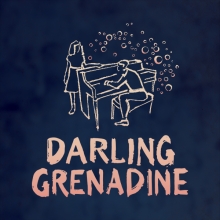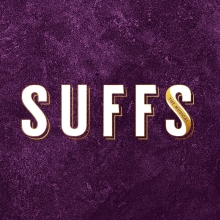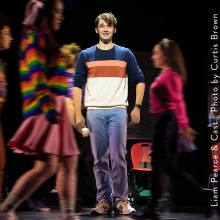
Full Synopsis
Prologue
The "Opening Fanfare" announces the appearance of two actors who will later play Dionysis and Xanthias. Addressing the audience, they decide to tell a story in traditional Greek style, one full of slapstick, music, dances, spectacle and commentary. The subject: a god and his slave. Their purpose: to save mankind. The actors raise their arms and sing a playful, yet thorough, set of timely instructions that tell the audience how to behave ("Invocation and Instructions to the Audience").
Act One
With a clap of thunder, the curtains open, revealing a large urn. A Chorus gathers and introduces "The Frogs" by Aristophanes. The time is now, the setting is Ancient Greece. With a growing rumble, the urn cracks in half and Dionysis, the Greek god of wine and drama, and his loyal slave, Xanthias, emerge. In Athens, the Peloponnesian War rages on with no signs of stopping. Dionysis is weary of man's complacency and growing hopelessness. He forms a plan to journey to the underworld to bring back George Bernard Shaw, whose writings, he believes, will save mankind. The journey may be treacherous, but there's only one thing that he fears: soggy, slimy frogs with small minds and a monster group mentality. But, frogs or no, the journey must be taken. Dionysis tells Xanthias to step to it – they are off to Hades ("I Love to Travel")!
Their first stop is the house of Dionysis' half-brother and the great warrior-hero, Herakles. Having made the journey to Hades before, Herakles advises Dionysis to "Dress Big" and gives him some of his own lion skins to wear. Disguised as Herakles, Dionysis forges on towards the River Styx ("I Love to Travel – Reprise").
Arriving at the docks, they meet the boatman, Charon, who prepares them for the trip ("All Aboard"). Once on the river, Dionysis mentions that he's heard that Styx is full of frogs, but Charon assures him that it's only a rumor. Charon passes Dionysis the oars and takes a little nap while Dionysis tells Xanthias about his beautiful wife, Ariadne, who died long ago ("Ariadne"). The song, while heartfelt and moving, puts Xanthias to sleep. Unbeknownst to the passengers, the boat has been surrounded by a number of very aggressive (and sycronized) frogs ("The Frogs"). A great and terrible frog pulls Dionysis into the water. His cries wake Xanthias, who tries to save his master, but it's too late. Dionysis has been dragged into the river by the frogs that he fears most.
Act Two
With his master gone, Xanthias decides to make the show all about himself. To his surprise, Dionysis climbs back on the boat, having miraculously escaped the frogs. Charon wakes up just in time to dock the boat in Hades. He tells them that they have 24 hours to get in and out before all hell breaks loose.
Dionysis is hell-bent on finding George Bernard Shaw. After a narrow escape from the thanaglebe, a terrible carnivorous bird, he and Xanthias head towards Pluto's palace.
The beautiful voices of the Dionysians – worshippers of pleasure and wine – fill the air. The travelers are momentarily distracted as they submerge themselves in the glorious Dionysian orgy ("Hymnos: Evoe!"). Dionysis throws himself into the heavenly debauchery, but Xanthias reminds him of their mission to find George Bernard Shaw. With the final strains of the song, they find themselves at the Palace of Pluto.
Knocking on the door, Dionysis is mistaken for Herakles by Aeakos, the keeper of the keys to the palace. Aeakos is furious to find Herakles back in Hades and swears vengeance upon him for killing Cerebus, the three-headed dog. When he leaves to get back up, Dionysis presses the lion skins upon Xanthias. Charisma, the sumptuous handmaiden of Persephone, enters and invites Xanthias (dressed as Herakles) to join her in a bath of hippopotamus milk. Jealous, Dionysis takes back the skins only to meet Virilla, Queen of the Amazons, who promises to rain down a world of hurt upon Herakles for stealing the girdle of the goddess Hippolyte. Aeakos returns with five huge guards, ready to avenge his beloved dog.
Not a moment too soon, Pluto arrives and sees that neither Dionysis nor Xanthias is (nor ever could be) Herakles. Pluto welcomes his nephew to Hades, telling them that it is really a wonderful place ("Hades"). Dionysis reveals his plan to bring George Bernard Shaw back to Earth to save mankind. Pluto tells him that all of the great dead playwrights are, just this moment, dining at the palace. Dionysis tells Pluto about the terrible situation on Earth, and an apathetic Greek Chorus steps in to remind the audience that, while serious matters are at hand, there's no need to worry – someone else higher up will take care of everything ("It's Only a Play"). Pluto takes Dionysis and Xanthias inside the palace to the banquet.
Xanthias and the Handmaiden head off to Persephone's house for a little fun. Xanthias, trying to impress her, tells the Handmaiden that he's George Bernard Shaw.
Dionysis bursts out of the palace to herald the arrival of the great playwright ("Shaw"). Shaw, surrounded by his loyal Shavians, arrives, and Dionysis tells him of his plan. Charon pulls up at the docks ("All Aboard – Reprise"). Shaw is eager to leave but is waylaid by the arrival of William Shakespeare. Shaw decides that he cannot leave Hades until he puts Will in his place. Rivalry percolates between the two great authors, then boils over into a full-fledge fight. Dionysis declares a contest between them, a "battle-royal" of words ("Bring out the Writings"). Dionysis calls out the topics – Woman, Man and the Life Force – as Shaw and Shakespeare battle with passages from their best works, Shaw arguing with sharp reason and Shakespeare countering with inspiring poetry ("The Contest"). In the heat of the battle, Ariadne appears to Dionysis. He calls a timeout and takes a moment to say a tender goodbye to his beloved. Inspired by Adriadne's words, Dionysis announces the final topic: Death. Shaw presents a stark interpretation of the subject from Saint Joan. Shakespeare counters with an impromptu song about the beauty of the natural cycle of life ("Fear No More"). Dionysis, moved by the great poet's words, declares Shakespeare the winner. A disbelieving Shaw is dragged offstage.
Xanthias returns with a very satisfied Virilla the Amazon to find that he is taking Shakespeare back to Earth instead of Shaw. Pluto doesn't want to lose Shakespeare, even for a moment, but eventually agrees. Shakespeare's not so sure that he wants to return to a world of suffering and grief, but Dionysis convinces him that he is desperately needed. They call for Charon and prepare to leave. Xanthias decides to stay in Hades for good, and they bid him farewell... for now.
As Dionysis and Shakespeare depart, Ariadne and the Dionysians serenade them ("Exodos"). Back on Earth, Shakespeare decides that what is needed is a new play – something to inspire mankind and raise them up. Dionysis and the Company encourage the audience to do their part – to shrug off complacency and take action – the world depends on them ("Final Instructions to the Audience"). It's time for a new start – no more froglike behavior! The actors' mission is complete.
Show History
Inspiration
The Frogs is based on the Ancient Greek play of the same name by Aristophanes.
Productions
The Frogs was first performed by the Yale Repertory Theatre in the Yale swimming pool for eight performances, beginning May 20, 1974. Burt Shevelove directed, with choreography by Carmen de Lavallade. Sondheim was becoming interested in contrapuntal writing, and most of the songs in the original 1974 version correspond to choral numbers in the Greek.
Critical Reaction
"Gleefully raiding from the bulging grab-bag of American musical-comedy tradition, Nathan Lane, Stephen Sondheim and Susan Stroman concoct a brash and breezy style covering everything from burlesque and vaudeville to Broadway extravaganza."
– Marilyn Stasio, "Variety"
Connect
Billing
- Music and Lyrics
- Freely Adapted by
A Comedy written in 405 B.C. by Aristophanes
Requirements
|
A comedy written in 405 b.c. by
|
freely adapted by
|
even more freely adapted by
|
|
ARISTOPHANES
|
BURT SHEVELOVE
|
NATHAN LANE
|
Originally produced by Lincoln Center Theater in 2004
Additionally, the following credit for use of certain lyrics from 'You Did It' from MY FAIR LADY shall appear in all programs for all productions of the Play licensed by MTI:
Video Warning
In accordance with the Performance License, you MUST include the following warning in all programs and in a pre-show announcement:ANY VIDEO AND/OR AUDIO RECORDING OF THIS PRODUCTION IS STRICTLY PROHIBITED.
Included Materials
| Item | Quantity Included |
|---|---|
| LIBRETTO/VOCAL BOOK | 20 |
| PIANO VOCAL SCORE | 2 |
Production Resources
| Resource |
|---|
| HOW DOES THE SHOW GO ON-10/CS |
| HOW DOES THE SHOW GO ON? |
| REFERENCE RECORDING |
| TRANSPOSITIONS-ON-DEMAND |
STANDARD ORCHESTRATION
| Instrumentation | Doubling |
|---|---|
| BASS | |
| CELLO | |
| FULL SCORE ACT 1 | |
| FULL SCORE ACT 2 | |
| HARP | |
| PERCUSSION | |
| PIANO | |
| REED 1 | |
| REED 2 | |
| REED 3 | |
| REED 4 | |
| TROMBONE | |
| TROMBONE 2 | |
| TROMBONE 3 | |
| TRUMPET | |
| TRUMPET 2 | |
| VIOLA | |
| VIOLIN | |
| VIOLIN 2 |




